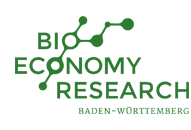Systems analysis on goals, visions, value chains and implementation steps of bioeconomy in Baden-Württemberg
The transformation to bioeconomy, which is based on biogenic resources, residues and renewable energy sources, is connected to far-reaching changes in the prevailing social, ecological and economic systems. This research project aims to contribute some elements to a systematic analysis of bioeconomy transformations and to strengthen the system understanding.
In a first step, visions, goals and expectations that are associated with bioeconomy were explored and a survey amongst scientists of the Baden-Württemberg research clusters conducted. In a second step, a systematic assessment of actors was carried out, including actors who develop, realize, and are potentially directly involved in the value chains in the three fields biogas, lignocellulose, and microalgae, as well as actors of traditional bioeconomy and those who are indirectly concerned. A systematic overview of the value chains in the three fields biogas, lignocellulose, and microalgae was prepared. A system of potential competitive relationships, both between and within the three basic fields material use, energetic use, and use as foodstuff was developed.
Overall, the project highlights the challenges and limitations for systematic approaches in the bioeconomy. Therewith, the improved capability of learning and amendment in bioeconomy policies gain high importance. Different courses of action are presented for the future shaping of the bioeconomy policy.
Project title | Bioeconomy in Baden-Württemberg - Systems analysis on goals, visions, value chains and implementation steps related to the three pathways biogas, lignocellulose und microalgae |
Institutions and research group | Karlsruhe Institute of Technology (KIT), Institute for Technology Assessment and Systems Analysis (ITAS) PD Dr. Rolf Meyer, Juliane Jörissen, Carmen Priefer |
